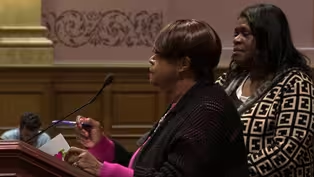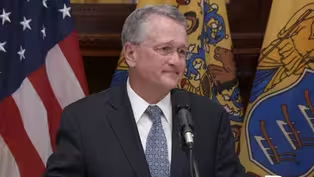NJ Spotlight News
Israel will 'continue fighting with full force' in Lebanon
Clip: 9/26/2024 | 5m 11sVideo has Closed Captions
Interview: Michael Boyle, Rutgers expert on U.S. policy in the Middle East
Israel's Prime Minister Benjamin Netanyahu says Israel will “continue fighting with full force” in Lebanon, despite the U.S. led push for a ceasefire. Netanyahu’s remarks came this week at the UN General Assembly, where diplomatic efforts to end the airstrikes along the Israel-Lebanon border have dominated talks.
Problems playing video? | Closed Captioning Feedback
Problems playing video? | Closed Captioning Feedback
NJ Spotlight News is a local public television program presented by THIRTEEN PBS
NJ Spotlight News
Israel will 'continue fighting with full force' in Lebanon
Clip: 9/26/2024 | 5m 11sVideo has Closed Captions
Israel's Prime Minister Benjamin Netanyahu says Israel will “continue fighting with full force” in Lebanon, despite the U.S. led push for a ceasefire. Netanyahu’s remarks came this week at the UN General Assembly, where diplomatic efforts to end the airstrikes along the Israel-Lebanon border have dominated talks.
Problems playing video? | Closed Captioning Feedback
How to Watch NJ Spotlight News
NJ Spotlight News is available to stream on pbs.org and the free PBS App, available on iPhone, Apple TV, Android TV, Android smartphones, Amazon Fire TV, Amazon Fire Tablet, Roku, Samsung Smart TV, and Vizio.
Providing Support for PBS.org
Learn Moreabout PBS online sponsorshipIsrael's Prime Minister Benjamin Netanyahu, says Israel will continue fighting with full force in Lebanon despite the U.S. led push for a cease fire.
Netanyahu his remarks came this week at the U.N. General Assembly, where diplomatic efforts to end the airstrikes along the Israel Lebanon border have dominated talks.
Israel is now preparing for a possible ground invasion in Lebanon, targeting Hezbollah militants.
More than 600 have been killed in Lebanon in the recent days.
The U.S. and several European Union countries are calling for an immediate 21 day ceasefire to allow for negotiations in the escalating conflict.
Calling the conflict intolerable, saying it presents an unacceptable risk of a broader regional escalation.
While this proposed deal only applies to the Israel Lebanon border, negotiators are hoping a three week pause could restart failed talks for a ceasefire and hostage release between Israel and Hamas.
For the latest developments, I'm joined by Rutgers associate professor of political science Michael Boyle.
Michael, thanks for joining us.
Thank you for having me.
All right.
So why is Israel now focusing on Hezbollah in Lebanon when the attack on Israel last year was waged by Hamas?
So there's been an ongoing sort of exchange of violence.
Hezbollah is and firing rockets into northern Israel.
That's led to the displacement of something to around 60 to 70,000 Israeli civilians from the north.
And then Israel has returned fire into southern Lebanon.
And so what we've seen recently is that the Netanyahu government has essentially declared that returning citizens to the north is now one of their key wartime objectives.
And the argument is that the only way they can do so is by, in some way at least, dealing with the threat of Hezbollah in southern Lebanon.
What is Israel's goal in attacking Lebanon?
So officially, their argument is that what they want to do is degrade the intelligence and military infrastructure of Hezbollah by doing targeted strikes on intelligence headquarters, rocket launchers, drone factories, and so on, in order to stop the threat to Israeli civilians.
And their long term goal is return of the 60 to 70,000 Israelis to the north.
And then also to ensure that these attacks cannot happen again.
Now, whether the strikes they're launching are going to be able to enable that outcome.
In other words, whether they'll be able to make enough of an impact on Hezbollah to actually cut the violence and stop attacks on Israeli civilians in the north is unclear.
You know, Michael, what are the reactions we are seeing from the international community about these attacks, which, like in Gaza, is also putting civilians in the crossfire?
Absolutely.
We've seen it estimates are at least 500 deaths so far in the attacks in Lebanon.
Thousands more have been moved and a significant number that are internally displaced.
International reaction has been very, I would say critical of Israel's decision, acknowledging, of course, that there are reasons to want to return citizens to the North.
There is an argument that this is not what is needed.
The danger is they can spill into a full scale war.
And at the moment, there's a ceasefire proposal on the table, backed by the United States and France.
That's essentially trying to push Israel and Lebanon, really, Lebanon representing Hezbollah, into a 21 day cease fire.
So Israel's coming under a lot of pressure at the moment to end this relatively quickly.
Michael, do these attacks in Lebanon mean that Israel has changed its focus and will no longer wage war on Gaza?
No, it doesn't.
And so, in effect, this is the chief strategic critique that you could make at the Netanyahu government that now effectively, they are still fighting in Gaza.
In fact, the attacks on Gaza have continued.
There's a fear among Palestinians in Gaza that they will then be forgotten, that that will become less of a focus, that now that there's a war in Lebanon and now Israel is fighting on the second front in Lebanon.
And there are increasing calls within Israel itself to say, look, is this strategically wise?
We have a situation in which we're now fighting essentially a two front war, and it's unclear how they are connected.
So for the moment, Hezbollah is arguing that they will not accept a ceasefire with Israel until there is also a cease fire in Gaza and Israel is essentially trying to delink the two.
So I think the fact that Israel is offering a two front more makes the diplomatic and the military situation far more complicated.
Well, you touched on that too so far that, you know, they are now calling for.
But how do you see this all playing out?
Well, Israel's position itself at the moment, saying that they will not accept the cease fire, that they're going to continue to fight with full force.
It's unclear to me whether that's in fact actually true or whether that's a negotiating tactic.
Right, because you strategically would probably say, oh, I'll never accept a cease fire and then eventually accept a cease fire.
Once you get terms that you're more satisfied with.
So if there is a possibility that we get to a reasonably quick cease fire, the greater danger is an all out regional war.
And that's now the question, because the chief sponsor of Hezbollah is Iran.
Iran feels implicated in this.
And the question that is kind of coming on everybody's mind is, is Iran going to come to the defense of Hezbollah, or is it going to let its proxy force essentially be attacked by the Israeli military?
So we face a real danger of an all out war.
At the same time, we also face the possibility that if Israel and Hezbollah could be convinced to sign a 21 day cease fire, we might get a kind of off ramp here.
Well, I guess we'll have to wait and see how this all unfolds.
Michael, thank you for joining us.
Thank you for having me.
Attorney general demands major reform of State Police
Video has Closed Captions
Clip: 9/26/2024 | 4m 44s | Scathing reports prompt AG Matt Platkin to act, including takeover of human resources department. (4m 44s)
Jersey City council approves tax abatement for museum plan
Video has Closed Captions
Clip: 9/26/2024 | 5m 21s | The council votes 6-3 in favor of a 30-year tax abatement for a Centre Pompidou outpost (5m 21s)
Port strike looms over dockworker contract negotiations
Video has Closed Captions
Clip: 9/26/2024 | 4m 48s | Longshoremen threaten to strike Oct. 1 (4m 48s)
Senate committee clears NJ Supreme Court nomination
Video has Closed Captions
Clip: 9/26/2024 | 1m 2s | Gov. Phil Murphy nominated former acting AG John Jay Hoffman in June (1m 2s)
Providing Support for PBS.org
Learn Moreabout PBS online sponsorship
- News and Public Affairs

Top journalists deliver compelling original analysis of the hour's headlines.

- News and Public Affairs

FRONTLINE is investigative journalism that questions, explains and changes our world.












Support for PBS provided by:
NJ Spotlight News is a local public television program presented by THIRTEEN PBS



